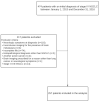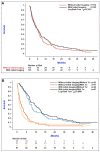Routine Neuroimaging in Patients with Stage IV Non-Small Cell Lung Cancer: A Single Center Experience
- PMID: 33801445
- PMCID: PMC8025755
- DOI: 10.3390/curroncol28020108
Routine Neuroimaging in Patients with Stage IV Non-Small Cell Lung Cancer: A Single Center Experience
Abstract
Background: There is a lack of consensus in current practice guidelines regarding routine neuroimaging in patients with stage IV non-small cell lung cancer (NSCLC) without neurologic symptoms, and there is a paucity of data on the impact of such imaging on overall survival (OS).
Methods: This retrospective study included 257 patients with stage IV NSCLC without neurologic symptoms diagnosed between January 1, 2013 and December 31, 2016 at Institut universitaire de cardiologie et de pneumologie de Québec (IUCPQ). The primary objective of this study was to compare the evolution of patients with stage IV NSCLC who had baseline brain imaging versus with who did not. Secondary objectives were to determine the proportion of patients who underwent brain imaging in their initial investigation and the proportion of patients who developed metachronous central nervous system (CNS) metastasis.
Results: CNS imaging, mainly with computed tomography (CT), was performed at diagnosis in 56% of patients, and the prevalence of synchronous CNS metastasis among these patients was 32%. There was no difference in median OS between patients who underwent initial CNS imaging and those who did not, but we did show a tendency for a higher cumulative incidence of metachronous CNS metastasis in patients without baseline imaging. These metachronous metastases were symptomatic and were more often not treated when compared to synchronous metastases.
Conclusions: In this small, unicentric retrospective study, there was no benefit with routine neuroimaging in terms of median OS in stage IV NSCLC patients without neurologic symptoms.
Keywords: central nervous system metastasis; neuroimaging; stage IV non-small cell lung cancer.
Conflict of interest statement
The authors declare no conflict of interest.
Figures





Similar articles
-
Early stage non-small cell lung cancer patients need brain imaging regardless of symptoms.Int J Clin Oncol. 2018 Aug;23(4):641-646. doi: 10.1007/s10147-018-1254-y. Epub 2018 Feb 26. Int J Clin Oncol. 2018. PMID: 29484515
-
The Incidence of Brain Metastases in Stage IV ROS1-Rearranged Non-Small Cell Lung Cancer and Rate of Central Nervous System Progression on Crizotinib.J Thorac Oncol. 2018 Nov;13(11):1717-1726. doi: 10.1016/j.jtho.2018.07.001. Epub 2018 Jul 5. J Thorac Oncol. 2018. PMID: 29981925 Free PMC article.
-
Is routine baseline brain imaging needed for all newly diagnosed non-small-cell lung cancer patients?J Comp Eff Res. 2019 Jun;8(8):569-575. doi: 10.2217/cer-2018-0148. Epub 2019 May 22. J Comp Eff Res. 2019. PMID: 31116030
-
Radical consolidative treatment provides a clinical benefit and long-term survival in patients with synchronous oligometastatic non-small cell lung cancer: A phase II study.Lung Cancer. 2019 Apr;130:67-75. doi: 10.1016/j.lungcan.2019.02.006. Epub 2019 Feb 7. Lung Cancer. 2019. PMID: 30885354 Clinical Trial.
-
Brain Imaging in Patients with Non-Small Cell Lung Cancer-A Systematic Review.J Clin Med. 2025 Jan 22;14(3):708. doi: 10.3390/jcm14030708. J Clin Med. 2025. PMID: 39941379 Free PMC article. Review.
Cited by
-
Factors associated with cognitive impairment and cognitive concerns in patients with metastatic non-small cell lung cancer.Neurooncol Pract. 2021 Sep 7;9(1):50-58. doi: 10.1093/nop/npab056. eCollection 2022 Feb. Neurooncol Pract. 2021. PMID: 35087675 Free PMC article.
-
Epidermal growth factor receptor mutations and brain metastases in non-small cell lung cancer.Front Oncol. 2022 Nov 15;12:912505. doi: 10.3389/fonc.2022.912505. eCollection 2022. Front Oncol. 2022. PMID: 36457515 Free PMC article. Review.
References
MeSH terms
LinkOut - more resources
Full Text Sources
Other Literature Sources
Medical

